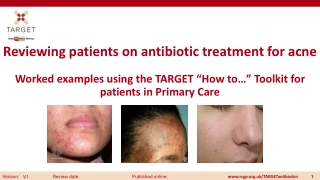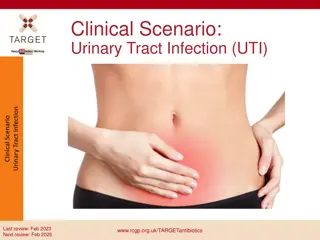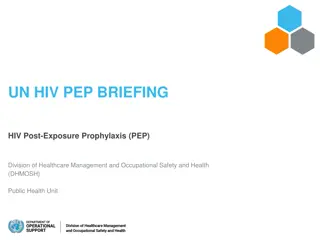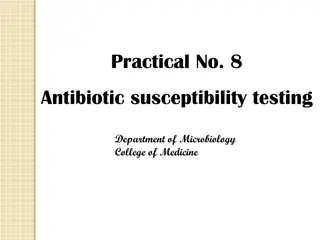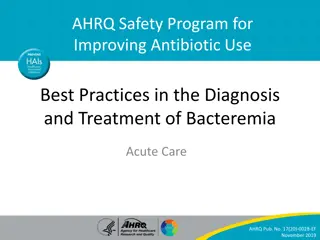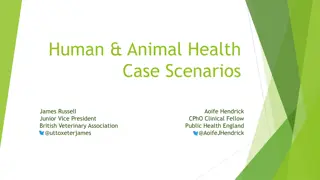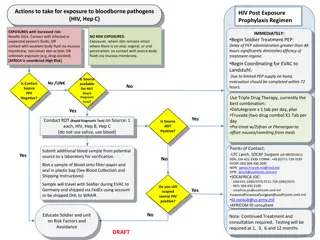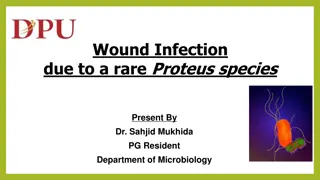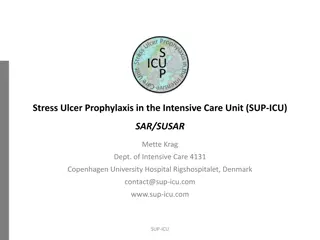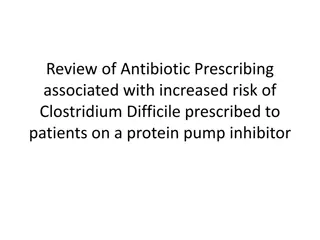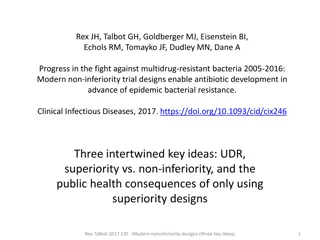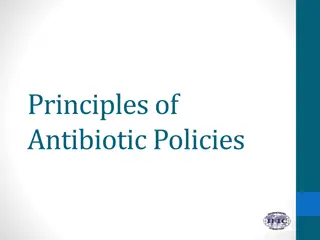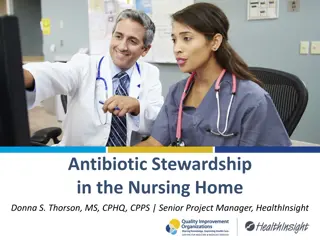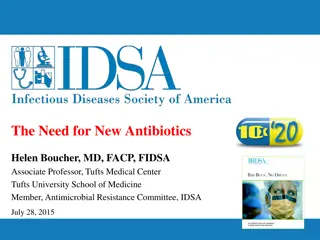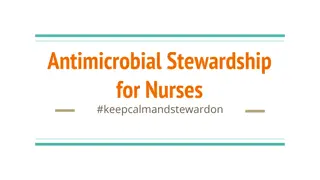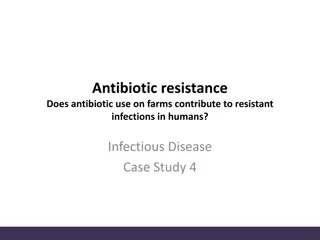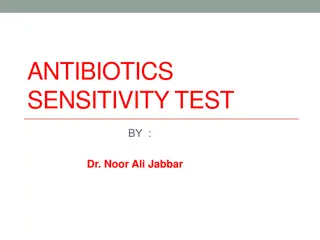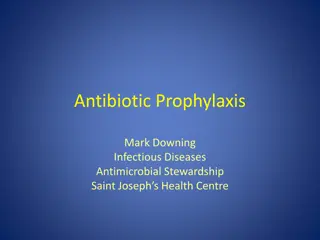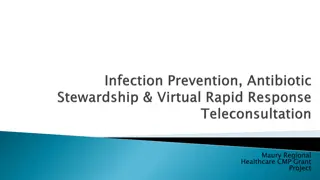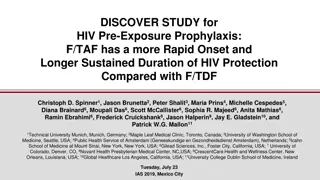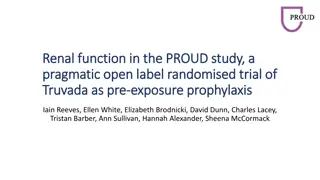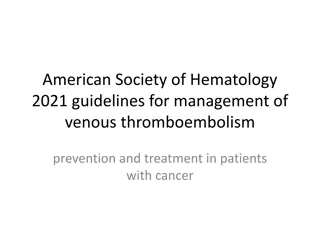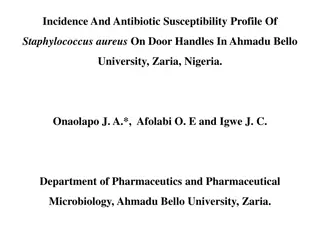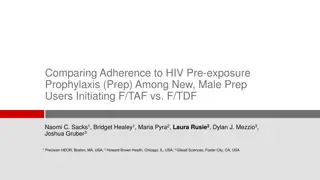Reviewing patients on antibiotic treatment for acne
Understanding the importance of reviewing patients on antibiotic treatment for acne, the resource provides insights on managing acne patients currently on antibiotics, referral considerations, and self-care advice. It emphasizes the need to address antibiotic resistance concerns and the challenges o
0 views • 24 slides
Surgical Prophylaxis and Antimicrobial Selection Guidelines in Surgery
Surgical prophylaxis involves administering antibiotics before contamination of previously sterile tissues to prevent infections. Common pathogens in surgical site infections include skin flora like S. aureus. Antimicrobial selection is based on the surgical procedure, likely pathogens, and safety c
4 views • 19 slides
Antibiotic Adaptation in Renal Insufficiency - Dosage Adjustments and Risks
Understanding the importance of adapting antibiotic therapy in patients with renal insufficiency is crucial to ensure efficacy and minimize risks. This content covers various factors influencing antibiotic selection, dosing adjustments based on patient parameters, and the risks associated with inapp
0 views • 52 slides
Update on HIV and AIDS Prevention Guidelines 2022
This update highlights key points from the PMK No. 23/2022 on combating HIV, AIDS, and STIs. It covers terminologies, goals for eliminating HIV and AIDS by 2030, and strategies such as PrEP and PEP. The guidelines emphasize timely interventions like Post-Exposure Prophylaxis (PEP) and Pre-Exposure P
3 views • 38 slides
Understanding Antibiotic Use in UTI Management: A Critical Review
Antibiotic use in urinary tract infections (UTIs) is crucial, but concerns exist due to rising resistance. E. coli, common in UTIs, can lead to resistant blood stream infections. Proper diagnosis and treatment are essential to combat antibiotic resistance and ensure patient recovery.
2 views • 44 slides
Understanding Antibiotic Susceptibility Testing Methods
Antibiotic susceptibility testing is crucial for determining effective antibiotics against bacterial infections. Common methods include Kirby-Bauer and agar disk diffusion, evaluating zones of inhibition to categorize susceptibility. Techniques involve seeding agar plates, placing antibiotic disks,
2 views • 17 slides
Understanding HIV Post-Exposure Prophylaxis (PEP) and Prevention
HIV Post-Exposure Prophylaxis (PEP) is a crucial emergency medical response for individuals exposed to HIV, aiming to prevent infection. It involves a regimen of medications, tests, and counseling services initiated within 72 hours of exposure. HIV transmission occurs through body fluids like blood,
3 views • 27 slides
Key Changes in Global Fund's Grant Cycle 7 (GC7) for 2023-2025 Allocation Cycle
New Programme Essentials introduced in GC7 focus on critical interventions to achieve global targets on HIV, TB, and Malaria, emphasizing human rights, gender equality, and community responses. The essentials cover areas such as HIV prevention, testing, treatment, and care, including key elements li
1 views • 27 slides
Understanding Antibiotic Susceptibility Testing
Antibiotic susceptibility testing is crucial in determining the effectiveness of antibiotics against specific bacteria. The Kirby-Bauer method, a standardized paper disk agar diffusion method, is commonly used for this purpose. By observing zones of inhibition around antibiotic disks on agar plates,
1 views • 21 slides
Best Practices for Managing Bacteremia and Antibiotic Use
This resource highlights best practices for managing bacteremia and improving antibiotic use in acute care settings. It covers recommendations for blood culture collection, organism-specific management, de-escalation of antibiotic therapy, and duration of antibiotic therapy. The content also discuss
0 views • 33 slides
Understanding Antibiotic Resistance in E. coli from Poultry, Humans, and the Environment in Malawi
This research project in Malawi investigates the patterns of antibiotic resistance in Escherichia coli isolated from poultry, humans, and the environment. Preliminary results reveal insights into knowledge, attitudes, practices, and microbiological aspects related to antibiotic use. The study aims t
5 views • 8 slides
Antibiotic Prophylaxis Compliance in Rural Queensland Hospitals
Antibiotic prophylaxis is crucial in surgeries to prevent infections. This study aims to determine compliance with prophylactic antibiotic use in surgeries conducted at Gympie, Dalby, and Kingaroy general hospitals in Southeast Queensland. The primary objective is to compare adherence to guidelines
0 views • 18 slides
Community Intravenous Therapy Team in Gloucestershire: Providing Outpatient Antibiotic Therapy
The Community Intravenous Therapy (IVT) Team in Gloucestershire offers outpatient antibiotic therapy services, accepting referrals from GPs, consultants, doctors, and specialist nurses. Changes to the service, details on antibiotic choices, frequently treated infective conditions, and contact inform
0 views • 9 slides
Understanding Antimicrobial Stewardship in Healthcare
Exploring the critical aspects of antimicrobial stewardship, including the reasons for antibiotic resistance, considerations for prescribing antibiotics, stewardship checklists, and the role of toolkits in promoting responsible antibiotic use to combat resistance. The importance of monitoring, docum
0 views • 20 slides
Biomedical Recommendations for Doxycycline Post-Exposure Prophylaxis
This clinical guideline discusses the use of doxycycline post-exposure prophylaxis (PEP) to prevent bacterial sexually transmitted infections (STIs) such as syphilis, chlamydia, and gonorrhea. It provides evidence-based recommendations for offering doxy-PEP to individuals engaging in condomless sex
0 views • 10 slides
Bloodborne Pathogens Exposure: HIV Post Exposure Prophylaxis Regimen
Take immediate action for exposure to bloodborne pathogens like HIV and Hepatitis C through a post-exposure prophylaxis (PEP) regimen. Administer PEP within 48 hours for increased-risk exposures like needle sticks or contact with infected fluids. Coordinate evacuation if needed and conduct Rapid Dia
0 views • 5 slides
Understanding Antibiotic Resistance in Recycled Wastewater
Explore the potential connection between recycled municipal wastewater and antibiotic resistance. Antibiotic-resistant bacteria pose a serious threat, fueled by factors like horizontal gene transfer and high antibiotic dosages in clinical settings. Environmental antibiotic resistance, linked to agri
4 views • 46 slides
Rare Proteus Species Wound Infection: Case Study and Management
A 65-year-old male presented with a wound infection caused by a rare Proteus species on his left 2nd toe. The patient had a history of diabetes and previous angioplasty. Despite initial antibiotic therapy, amputation of the affected toe was required due to progressive infection. The causative pathog
1 views • 21 slides
Stress Ulcer Prophylaxis in ICU - Adverse Reactions Reporting Guidelines
Guidelines for reporting adverse reactions in Stress Ulcer Prophylaxis in the Intensive Care Unit (SUP-ICU), including definitions of Adverse Reactions (AR), Serious Adverse Reactions (SAR), Adverse Events (AE), Serious Adverse Events (SAE), SARs in SUP-ICU, and SUSARs. Specific conditions considere
0 views • 8 slides
Understanding Differences in IV Antibiotic Administration in Emergency Departments
Characterizing the shift from intravenous piggyback to intravenous push antibiotic administration in the emergency department, this study highlights the impact of antibiotic timing on patient outcomes, emphasizing the importance of quick and appropriate empiric antibiotic administration. Insights fr
0 views • 21 slides
Antibiotic Prescribing Impact on Clostridium Difficile Risk in Patients on Protein Pump Inhibitors
Antibiotic prescribing in patients on protein pump inhibitors (PPIs) is associated with an increased risk of Clostridium difficile infection. A review was conducted on high-risk antibiotic prescriptions, revealing instances where patients were prescribed against guidelines, leading to potential comp
0 views • 5 slides
Understanding Modern Non-inferiority Trial Designs in Antibiotic Development
This article discusses the significance of non-inferiority designs in advancing antibiotic development to combat multidrug-resistant bacteria. It emphasizes the importance of distinguishing between UDR, MDR, and XDR bacterial categories in trial design, highlighting challenges in selecting comparato
0 views • 12 slides
Principles of Antibiotic Policies and Resistance
Antibiotic policies play a crucial role in combating antibiotic resistance. Understanding mechanisms of resistance, proper antibiotic use, and the importance of stewardship programs are key in preserving antibiotic effectiveness. The discovery of antibiotics by Fleming revolutionized medicine, but m
0 views • 32 slides
Antibiotic Stewardship in Nursing Homes
This information discusses the importance of antibiotic stewardship programs in long-term care facilities, specifically nursing homes. It outlines the core elements of such programs, strategies for appropriate prescribing patterns, and how these programs support continuity of care. The content empha
0 views • 26 slides
Understanding Antibiotic Resistance: A Comprehensive Overview
Explore the world of antibiotic resistance through a journey that covers the basics, historical developments, mechanisms, consequences, and current challenges. From the first antibiotic discovery to the impact of overuse, this overview delves into the crucial topic of microbial connections and the r
0 views • 19 slides
The Urgent Need for Developing New Antibiotics
Antibiotic resistance has led to devastating consequences, with lives lost and individuals suffering from resistant infections. This urgency is highlighted through real-life cases of individuals facing complications due to antibiotic-resistant bacteria. The narrative follows a 46-year-old man with e
0 views • 19 slides
Innovating Antibiotic Research & Development: The POWER Act Impact
Increased investment in antibiotics and overcoming barriers to development are crucial to combat rising antibiotic resistance. The PATH Act aims to rejuvenate antibiotic R&D by addressing challenges such as competition for funding, limited pipeline drugs, and difficulty in conducting trials due to a
0 views • 11 slides
Understanding Antimicrobial Stewardship in Nursing
Antimicrobial stewardship is crucial in combating antibiotic resistance and promoting appropriate use of antimicrobials. Nurses play a vital role as advocates for correct antibiotic use and are central in patient care, recognizing infections and adverse events. Core elements of antibiotic stewardshi
0 views • 10 slides
Antibiotic Stewardship Awareness Event at University of Pittsburgh
Annual Get Smart Week event at University of Pittsburgh focusing on antibiotic stewardship to raise awareness about the problem of antibiotic resistance. The event featured Dr. Karen Hacker from the Allegheny County Health Department and highlighted the importance of proper antibiotic use to combat
0 views • 6 slides
Antibiotic Resistance in Humans: Impact of Antibiotic Use on Farms
Antibiotic resistance is a growing concern, with evidence suggesting a link between antibiotic use in farm animals and resistant infections in humans. Explore a case study of a Salmonella outbreak in Denmark, where antibiotic treatment failed, leading to fatalities. Learn about the role of selection
0 views • 25 slides
Importance of Antibiotic Sensitivity Testing in Infection Treatment
Antibiotic sensitivity testing is crucial for identifying the most effective antibiotic treatment for bacterial infections. It helps determine the susceptibility of bacteria to antibiotics, guiding clinicians in administering targeted therapy for better outcomes in cases where standard treatments fa
0 views • 11 slides
Antibiotic Prophylaxis in Perioperative Care
Explore the rational approach to perioperative antibiotic use, the importance of antibiotic stewardship in the operating room, and guidelines for selecting and administering antibiotics to prevent surgical site infections. Understand when antibiotic prophylaxis is necessary, which antibiotics to use
0 views • 44 slides
Evidence-Based Treatment of Otitis Externa: Topical Antibiotic/Steroid Drops Effectiveness Review
Clinical guidelines for treating acute otitis externa recommend using topical antibiotic/steroid drops based on the severity of symptoms. This review explores the effectiveness of this treatment approach compared to using only topical antibiotic drops in primary care settings. Search strategies in m
0 views • 14 slides
Improving Healthcare Outcomes through Antibiotic Stewardship and Virtual Rapid Response Program
This project focuses on enhancing healthcare outcomes by implementing an Antibiotic Stewardship program and utilizing Virtual Rapid Response Teleconsultation in skilled nursing facilities. The initiative includes developing best practice protocols, educating staff on infection prevention, antibiotic
0 views • 14 slides
F/TAF vs. F/TDF for HIV Pre-Exposure Prophylaxis: DISCOVER Study Findings
Study results reveal that F/TAF provides rapid onset and longer sustained HIV protection compared to F/TDF in pre-exposure prophylaxis. The randomized noninferiority trial included 2694 participants with a primary analysis at weeks 48 and 96. Disclosure statements indicate involvement of various hea
0 views • 21 slides
Successful Reduction of Antibiotic Usage in Italian Poultry Sector
Italian poultry industry has effectively reduced antibiotic use by implementing proactive strategies and a science-based plan. The approach focuses on prevention, sustainable farming practices, and targeted therapies, leading to a significant reduction in antibiotic usage. Key pillars and commitment
0 views • 10 slides
Renal Function Monitoring in the PROUD Study: Truvada Pre-Exposure Prophylaxis Trial
Renal function in the PROUD study, a pragmatic open-label randomized trial of Truvada as pre-exposure prophylaxis, was monitored closely. No significant safety concerns were found, with similar renal adverse events between the placebo and Truvada groups. Regular monitoring included baseline serum cr
0 views • 16 slides
American Society of Hematology 2021 Guidelines for Venous Thromboembolism in Cancer Patients
The American Society of Hematology (ASH) 2021 guidelines provide recommendations for preventing and treating venous thromboembolism (VTE) in cancer patients. The guidelines cover primary prophylaxis for hospitalized medical patients and those undergoing surgery, emphasizing the use of thromboprophyl
0 views • 23 slides
Incidence and Antibiotic Susceptibility of Staphylococcus aureus on Door Handles in Ahmadu Bello University
Environmental microorganisms, like Staphylococcus aureus, play a significant role in morbidity and mortality. This study explores the incidence and antibiotic susceptibility profile of Staphylococcus aureus isolated from door handles in Ahmadu Bello University, Zaria, Nigeria. The research aims to a
0 views • 22 slides
Comparing Adherence to HIV Pre-exposure Prophylaxis (PrEP) Among New Male PrEP Users Initiating F/TAF vs. F/TDF
This study aims to describe real-world use patterns and HIV seroconversion rates for individuals using emtricitabine/tenofovir disoproxil fumarate (F/TDF) vs. emtricitabine/tenofovir alafenamide (F/TAF) as pre-exposure prophylaxis (PrEP) for HIV prevention. The retrospective analysis includes newly
0 views • 9 slides
